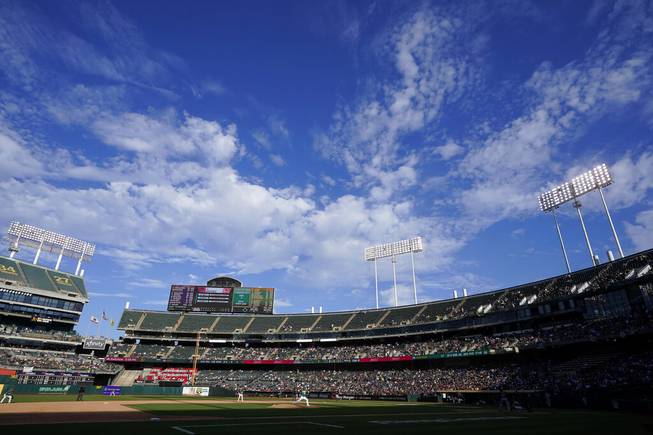
Jeff Chiu / AP
Oakland Athletics’ Yusmeiro Petit, bottom center, pitches against the Boston Red Sox during the eighth inning of a baseball game in Oakland, Calif., Saturday, July 3, 2021.
Friday, April 8, 2022 | 5:05 p.m.
Executives with Major League Baseball and the Office of the Commissioner have OK’d a potential relocation of the Oakland Athletics to Las Vegas, but a bid to move the team may be blocked if the club asks for a public subsidy to fund a stadium, according to the New York Post.
Citing anonymous sources, the Post reported MLB Commissioner Rob Manfred recently talked about the potential move with Nevada Gov. Steve Sisolak, though the Democratic governor appeared “reluctant” to provide any public monies amid his re-election campaign.
One source told the Post, “baseball has already cleared the move,” signaling that team owners would vote in favor of relocating the team. Manfred, however, indicated Nevada would likely need to provide some public funding for a $1 billion, 30,000-seat, domed ballpark, the Post reported.
Manfred did not set a minimum amount of public financing needed for a proposed Las Vegas ballpark, but sources told the Post that about $275 million would be needed. Sisolak told the Nevada Independent in December that he would not support a hotel room tax — which was implemented to fund the Raiders’ Allegiant Stadium — to build a baseball stadium.
In a statement to the Sun, Sisolak spokeswoman Meghin Delaney said the governor still does not support a room tax but would not confirm if other public financing options remain on the table.
“Governor Sisolak knows the great economic opportunity offered to Nevada by bringing in more professional sports franchises,” Delaney said. “And there is no better city than Las Vegas for sporting events — as evidenced by the great success of the Vegas Golden Knights, the Las Vegas Raiders and the recent announcement regarding the Formula One Las Vegas Grand Prix.
“The Governor has been clear from the start that he would not consider a room tax package for this potential move, and that has not been an issue in his conversations with the Commissioner or the Athletics leadership. The Governor and his team will continue to pursue bringing business opportunities to Nevada to further cement our status as the sports and entertainment capital of the world,” Delaney said.
MGM Resorts International, Nevada’s largest private employer which operates nearly 40% of the hotel rooms on the Las Vegas Strip, might also oppose the A’s potential move and might be “threatened” by the addition of a potential baseball stadium, according to the Post’s report.
One source told the Post that MGM initially objected to the building of Allegiant Stadium but was persuaded after learning most fans going to Raiders games would be tourists who might not be in the city otherwise. In 2016, MGM and AEG Worldwide paid a combined $375 million with no public money to build the 20,000-seat T-Mobile Arena, home to the Golden Knights.
“They (MGM) took one for the city in allowing the Raiders,” the source told the Post.
A’s President Dave Kaval, however, insists the club remains on a “parallel path” in pursuing plans to build a new ballpark in either Oakland or Las Vegas. He told the Sun last week the team has placed bids at five sites to build a stadium around the Las Vegas resort corridor, with hopes of announcing a final site within the next four to six weeks.
“We hope to have some type of announcement on an actual location by May, which I think would be a big, big step forward, and it would be exciting to be able to showcase that to the community,” Kaval said. “In terms of timing, we’re working very hard to balance the thoughtfulness and negotiating with the different parties with our effort to just try to make progress and get to the next stage.”
The A’s and the City of Oakland were served with a lawsuit last week in a bid to derail the proposed $12 billion development dubbed the Howard Terminal project, which includes a $1 billion waterfront ballpark along the San Francisco Bay.
That lawsuit, filed by the East Oakland Stadium Alliance as well as other area trade groups aims to challenge the Oakland City Council’s February certification of the environmental impact report for the Howard Terminal project.
Last month, Oakland councilwoman Carroll Fife held an online town hall exploring the possibility of bringing the final vote for the Howard Terminal project to a public vote via ballot measure. That came roughly a week after a subcommittee for the San Francisco Bay’s governing body voted against removing port authority protections for the Howard Terminal site and transferring use to the development.
The A’s received the OK to look for possible cities to relocate since the team’s lease at the RingCentral Coliseum — where the team has played since 1968 — expires in 2024.
The A’s did not respond to a request for comment by the time of this story’s publication.
